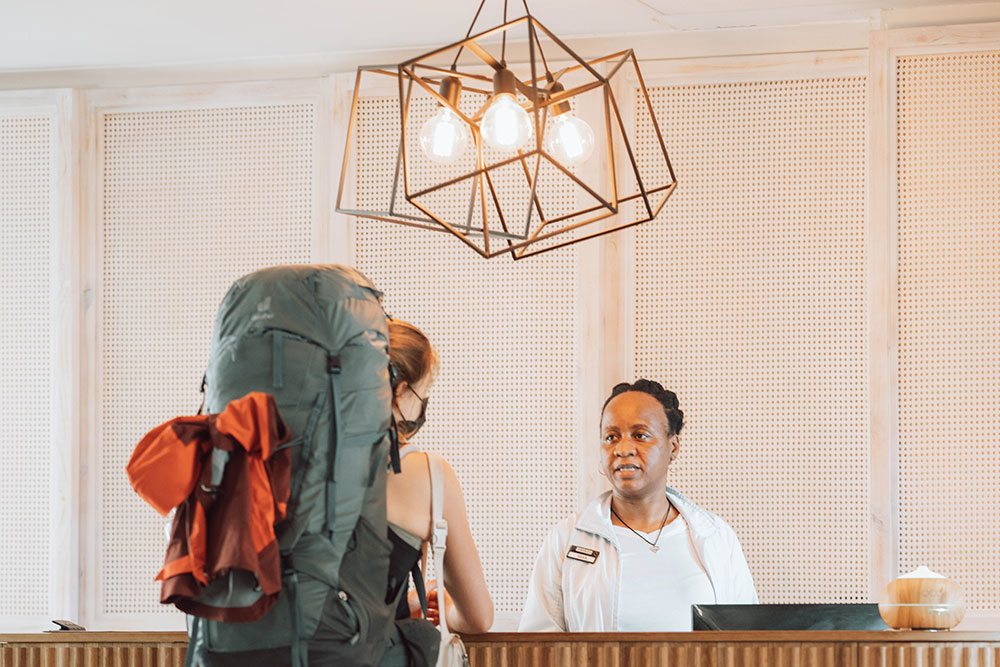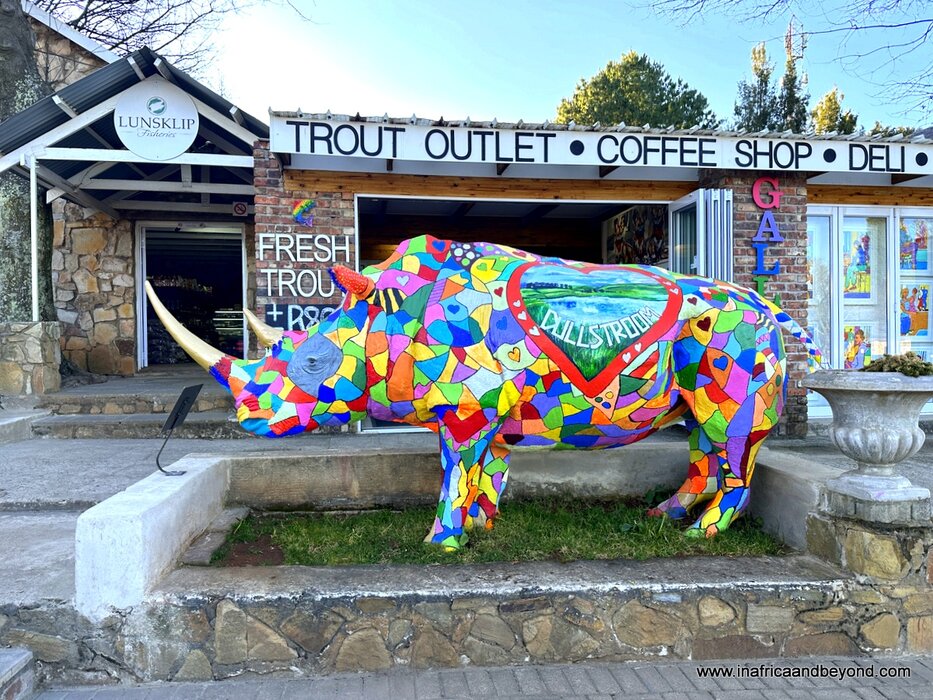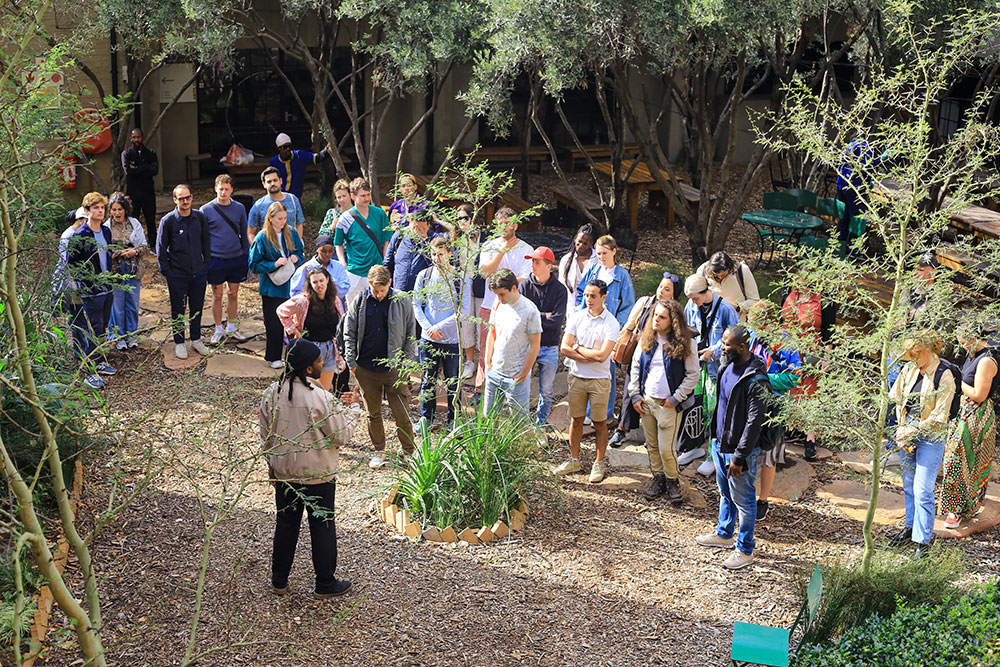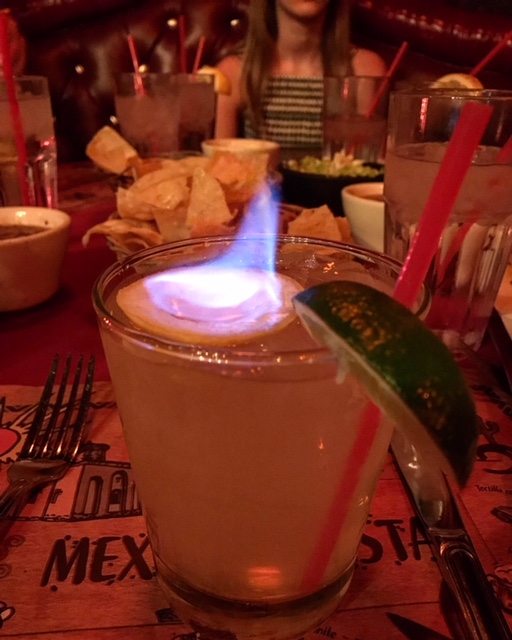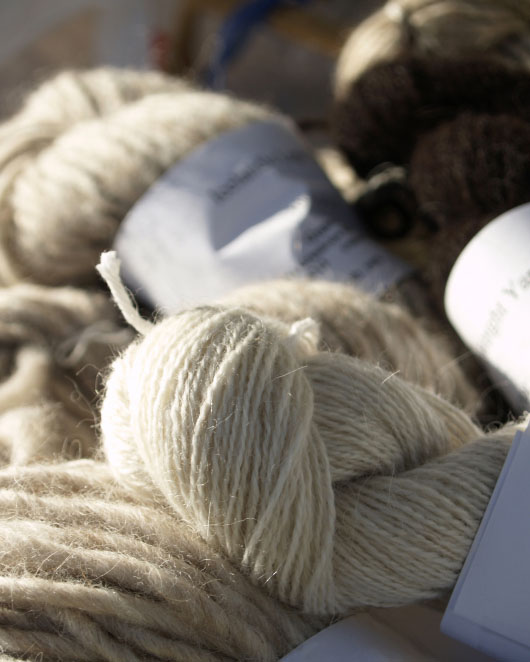
1) Ulu Knives
Originally made from slate, these traditional, curved knives now feature a stainless steel blade and a wooden handle. Historically used by Indigenous peoples for a variety of tasks including skinning animals, cutting meat and preparing food, the oldest ulus date back to 2500 BC. Today, ulus are cherished as unique and functional pieces of art, often made using local materials like bone, antler or wood. The Ulu Factory in Anchorage showcases a large selection. If you’re flying home, be sure to put this one in your checked luggage.
2) Carvings by Alaska Native Artists
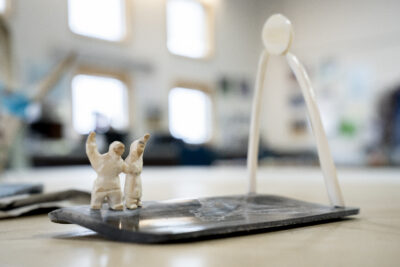
Ivory whale bone art. Photo Credit: Lexi Qass’uq Trainer
Alaska is home to 20 Indigenous cultures, each with its own diverse artistic expression. Carvings by Indigenous artists are often carved from materials like wood, bone, ivory or stone, and feature creations ranging from birch bowls to ivory dice. If you’re looking to purchase new marine mammal ivory, you must purchase from an Alaska Native artist.
Each piece carries with it a sense of history and connection to Alaska’s diverse native cultures, making it a meaningful keepsake for visitors. Look for variations between carvings to ensure that your piece has been carved, not cast. Another way to tell a carving from a casting is that stone is cool to the touch while resin is warm.
3) Mukluks
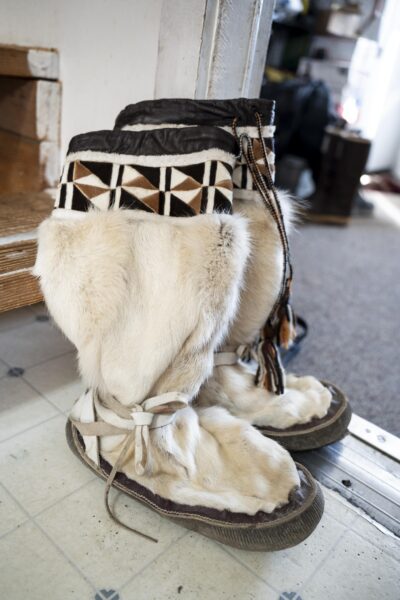
Inupiaq fur boots. Photo Credit: Lexi Qass’uq Trainer
Furry, warm boots have been all the rage for years in Hollywood, but the original mukluk was worn by the Inuit and Yup’ik peoples to stay warm in Arctic winters. Mukluks are not only practical for cold weather but are often adorned with decorative beadwork or traditional designs that reflect Indigenous artistry.
Modern versions come in a wide range of styles—all with practical, rubber soles. Purchase an authentic pair of mukluks made from beaver or coyote and guarantee the warmth of your feet for many winters.
4) Musk Ox Knit Goods and Yarn

Called “qiviut,” the underwool of the musk ox is incredibly soft, lightweight and warm—eight times warmer than sheep’s wool—and is prized for its luxurious feel and excellent insulation properties. Operated by an Alaska Native cooperative, Oomingmak in Anchorage sells hand-knit qiviut goods. Their knitters employ patterns unique to their villages, creating a range of items including scarves, hats, gloves and sweaters, each both beautiful and practical. For those interested in knitting their own creations, qiviut is available at many craft stores throughout Alaska.
5) Art
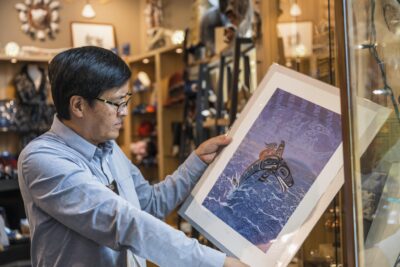
Photo Credit: Neal Alfano
Alaska’s locally-made crafts aren’t all traditional. Many Alaskans use the long winters to create fine works of contemporary art. Visit galleries in Fairbanks, Talkeetna and Anchorage to see what you can find! Purchasing local art not only supports the region’s artists and artisans, but also contributes to the preservation of Alaska’s artistic traditions. If your eyes are bigger than your suitcase, most galleries will arrange to have your artwork sent to your home.
6) Birch Syrup
When in Alaska, dine like the locals and try birch syrup! Unlike maple syrup, birch syrup is produced from the sap of birch trees with a distinctively earthy, caramel-like taste. This specialty syrup is produced in limited quantities because of the large amount of sap that is needed to make the syrup — double the amount needed for maple syrup. Bringing home a bottle of Alaska birch syrup is a great way to reminisce after a trip or share a taste of Alaska with friends and family.
7) Alaska Recipe Book
An Alaska recipe book showcases the state’s unique ingredients and culinary traditions, featuring recipes with ingredients like wild-caught seafood, game meats like moose or caribou, and locally grown produce adapted to the northern climate. Try your hand at making a smoked salmon chowder or a blueberry pie with wild berries. By bringing home an Alaska recipe book, visitors can recreate real Alaska dishes and savor the flavors of the state in their own kitchens. While some ingredients may be specific to the northern climate, many cookbooks provide substitution tips that still capture the taste of Alaska. Either way, an Alaska recipe book offers a delicious way to relive great memories.
8) Gold Nugget Jewelry
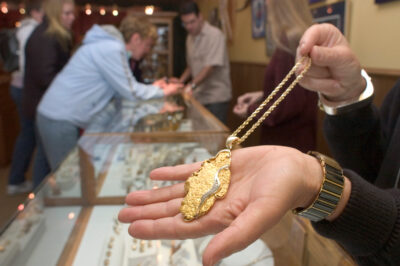
Photo Credit: State of Alaska / Matt Hage
Alaska’s rich history of gold mining makes gold nugget jewelry a memorable souvenir. Gold rushes drew prospectors to the state seeking fortune and have shaped Alaska as it is today. Gold nugget jewelry, fashioned from naturally occurring nuggets found in Alaska’s rivers and streams, showcases the raw beauty of this precious metal. Each nugget is unique in shape and texture, making every piece of gold nugget jewelry truly one-of-a-kind and a timeless souvenir.
9) Smoked Salmon
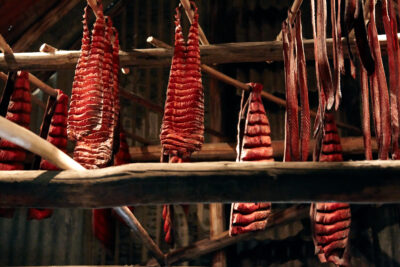
Photo Credit: State of Alaska / Chris McLennan
Alaska is renowned for its wild salmon, including varieties like sockeye, king and coho. Smoked salmon is a delicious and versatile treat that can be enjoyed on its own or incorporated into various dishes, not to mention it travels well! Some favorite ways to enjoy smoked salmon include with crackers, cream cheese and capers, mixed into an omelet or in a creamy pasta dish. You can find a variety of smoked salmon options in gift stores across the state.
10) Reindeer Sausage
Made from lean and flavorful reindeer meat, reindeer sausage is known for its savory flavor and can be used in a variety of dishes, from breakfast hashes to hearty stews. Whether enjoyed on its own or incorporated into favorite recipes, reindeer sausage from Alaska makes for a distinctive and delicious souvenir. To bring it home, we recommend sausage sticks or jerky that can easily be packed in your suitcase. If wanting to enjoy the sausage fresh, it must be shipped frozen.
11) Beaded Jewelry
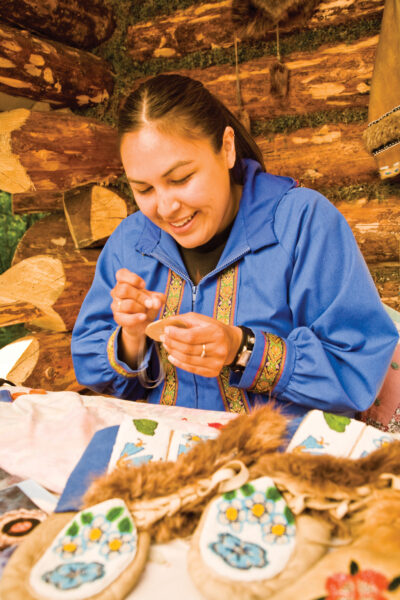
Photo Credit: State of Alaska / Michael DeYoung
Indigenous cultures in Alaska have a rich tradition of creating detailed beadwork, using techniques passed down through generations. Beaded earrings, necklaces and bracelets showcase a stunning array of colors and patterns, often created with traditional patterns inspired by nature and wildlife. Alaska Native beadwork can also be found sewn onto fabric items including purses, shoes and gloves. The style of beaded jewelry varies by region, offering a diverse selection depending on where you are in Alaska.
12) Fur Gifts
Fur garments and accessories are designed from high-quality pelts such as fox, beaver and mink. Fur gifts can range from classic fur hats and mittens to stylish fur-lined jackets and boots, each carefully crafted by skilled artisans. These can serve as both a practical accessory for cold climates and a timeless fashion statement. In Anchorage, you can visit David Green Master Furrier, one of the state’s oldest furriers. In Juneau, the Alaska Fur Gallery offers an extensive selection of fur fashion, and in Fairbanks, Alaska Fur Co. also has a wide array of fur products.
13) Kuspuks
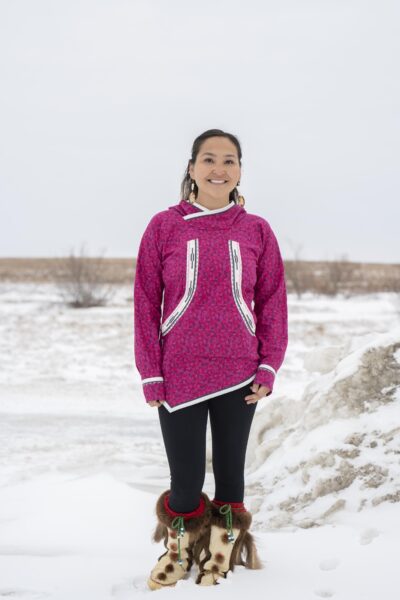
A vibrant, pink Kuspuk. Photo Credit: Lexi Qass’uq Trainer
Kuspuks are a traditional Alaska garment, originally worn by Indigenous women from Yup’ik communities. Kuspuks are known for their intricate designs that often reflect the heritage of a specific village, featuring colorful patterns and practical elements such as large front pockets and hooded tops. Today, kuspuks are worn by locals throughout Alaska as cozy and stylish everyday attire. Lightweight and fun, a kuspuk makes a perfect keepsake for those looking to show off some genuine Alaska fashion!
14) Jade

The official state gem of Alaska is nephrite jade, a stone that has been prized by Indigenous cultures for thousands of years for its beauty and spiritual qualities. Historically used by Indigenous communities for tools, ornaments and ceremonial objects, Alaska jade is treasured for its luminescent colors and smooth surfaces. The colors range from various hues of green to yellow, red, black, and white, with lavender jade being the most highly valued due to its rarity. Today, visitors can explore a wide selection of beautiful jade items, including jewelry, dolls, figurines, knives and more. Jade pieces are available across Alaska’s gift shops and galleries.
15) Birch Bowls
Handcrafted from birch wood, wooden bowls are a common sight in Alaska’s northern climates where birch trees thrive. Abundant in the region, these trees have been used by Alaska Native cultures for centuries to create both functional and decorative items. Birch is known for their pale gold color, which often showcases beautiful natural patterns and grain variations. Available in all sizes, they are perfect for traveling or shipping. While birch bowls can be found throughout the state, the Great Alaskan Bowl Company in Fairbanks offers a vast selection, along with a variety of birch décor and tools.
How you’ll know it’s real
When purchasing authentic Alaska gifts, look for an official Made in Alaska seal. In addition, art from Indigenous artists often displays a Silver Hand tag and an artist bio.
For more information on the legalities, read this pamphlet from the State of Alaska. Learn more about the tribes of Alaska and find souvenirs at the Alaska Native Heritage Center in Anchorage.
What souvenirs will you bring home from your Alaska vacation?
Publisher: Source link
Latest Posts
-
31 July 2025
-
26 July 2025
-
14 July 2025
-
01 July 2025
-
07 August 2025
-
29 July 2025
-
20 February 2025
-
04 February 2025
Newsletter
Sign up for free and be the first to get notified about new posts.
Get The Best Blog Stories into Your icountox!
Sign up for free and be the first to get notified about new posts.






